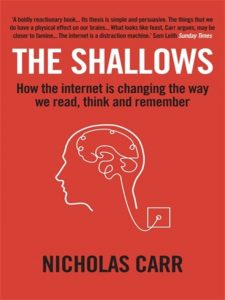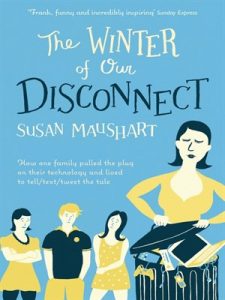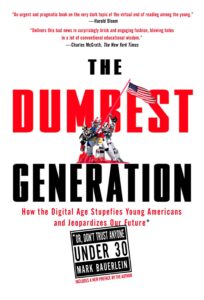The Shallows: What the Internet is Doing to Our Brains
Nicholas Carr (2010)
 “Is Google making us stupid?” When Nicholas Carr posed that question, in a celebrated Atlantic Monthly cover story, he tapped into a well of anxiety about how the Internet is changing us. He also crystallized one of the most important debates of our time: As we enjoy the Net’s bounties, or are we sacrificing our ability to read and think deeply?
“Is Google making us stupid?” When Nicholas Carr posed that question, in a celebrated Atlantic Monthly cover story, he tapped into a well of anxiety about how the Internet is changing us. He also crystallized one of the most important debates of our time: As we enjoy the Net’s bounties, or are we sacrificing our ability to read and think deeply?
Now, Carr expands his argument into the most compelling exploration of the Internet’s intellectual and cultural consequences yet published. As he describes how human thought has been shaped through the centuries by “tools of the mind”—from the alphabet to maps, to the printing press, the clock, and the computer—Carr interweaves a fascinating account of recent discoveries in neuroscience by such pioneers as Michael Merzenich and Eric Kandel. Our brains, the historical and scientific evidence reveals, change in response to our experiences. The technologies we use to find, store, and share information can literally reroute our neural pathways.
Building on the insights of thinkers from Plato to McLuhan, Carr makes a convincing case that every information technology carries an intellectual ethic—a set of assumptions about the nature of knowledge and intelligence. He explains how the printed book served to focus our attention, promoting deep and creative thought. In stark contrast, the Internet encourages the rapid, distracted sampling of small bits of information from many sources. Its ethic is that of the industrialist, an ethic of speed and efficiency, of optimized production and consumption—and now the Net is remaking us in its own image. We are becoming ever more adept at scanning and skimming, but what we are losing is our capacity for concentration, contemplation, and reflection.
Part intellectual history, part popular science, and part cultural criticism, The Shallows sparkles with memorable vignettes—Friedrich Nietzsche wrestling with a typewriter, Sigmund Freud dissecting the brains of sea creatures, Nathaniel Hawthorne contemplating the thunderous approach of a steam locomotive—even as it plumbs profound questions about the state of our modern psyche. This is a book that will forever alter the way we think about media and our minds.

 For any parent who’s ever IM-ed their child to the dinner table – or yanked the modem from its socket in a show of primal parental rage – this account of one family’s self-imposed exile from the Information Age will leave you ROFLing with recognition. But it will also challenge you to take stock of your own family connections, to create a media ecology that encourages kids – and parents – to thrive.
For any parent who’s ever IM-ed their child to the dinner table – or yanked the modem from its socket in a show of primal parental rage – this account of one family’s self-imposed exile from the Information Age will leave you ROFLing with recognition. But it will also challenge you to take stock of your own family connections, to create a media ecology that encourages kids – and parents – to thrive. “For decades, concern has been brewing about the dumbed-down popular culture available to young people and the impact it has on their futures. But at the dawn of the digital age, many thought they saw an answer: the internet, email, blogs, and interactive and hyper-realistic video games promised to yield a generation of sharper, more aware, and intellectually sophisticated children. The terms “information superhighway” and “knowledge economy” entered the lexicon, and we assumed that teens would use their knowledge and understanding of technology to set themselves apart as the vanguards of this new digital era.
“For decades, concern has been brewing about the dumbed-down popular culture available to young people and the impact it has on their futures. But at the dawn of the digital age, many thought they saw an answer: the internet, email, blogs, and interactive and hyper-realistic video games promised to yield a generation of sharper, more aware, and intellectually sophisticated children. The terms “information superhighway” and “knowledge economy” entered the lexicon, and we assumed that teens would use their knowledge and understanding of technology to set themselves apart as the vanguards of this new digital era.